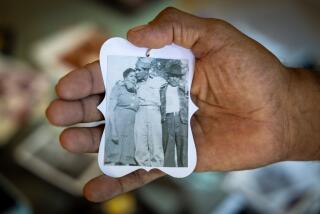Homecoming : First of Street’s Five Fighting Sons Returns Safe From War
- Share via
When Adrian came marching home, it was well past midnight. La Verne Avenue was quiet and dark, but that didn’t matter.
Inside the modest stucco home, a shower of hugs, tears, kisses, gifts and questions awaited Army Spec. 4 Adrian Yracheta.
“Hey Mom,” he said, “I’m home.”
Yracheta was the first of the five Chicano boys sent by La Verne Avenue to the Persian Gulf to return home.
All survived without a scratch. But even though everyone on the East Los Angeles street knows this, even though they know the fighting is finished for U.S. soldiers, it really isn’t over until all their sons are back home.
“I hate this waiting,” said Rachel Reyes, the unofficial leader of the La Verne parents. “This is worse than waiting for 12 o’clock on New Year’s Eve.”
For most of them, the waiting is about over.
Reyes’ son Timothy, a Navy SEAL member, was aboard the Saratoga when the aircraft carrier returned last week to its home port in Florida. The 21-year-old is expected home in the coming weeks, his mother said.
Timmy’s closest friend in the neighborhood, William Martinez of the 82nd Airborne Division, has arrived back at the unit’s home at Ft. Bragg, N.C. His mother says he could be home by next week.
Parents of the two other boys--Ramon Alberto Sandoval Jr., 23, and Manuel Castro, 23, both of the Marine Corps--reported that no firm date has been set for their sons’ homecoming.
But Yracheta was first, and that made his homecoming something special.
For his family and friends, the waiting for the paratrooper member of the Army’s 82nd ended at 9:35 p.m. Wednesday near the baggage claim area inside Terminal 1 at Los Angeles International Airport.
When the uniformed soldier, wearing his maroon beret, came into view, the 30 or so well-wishers, decked out with banners, yellow ballons and homemade buttons with Adrian’s picture, let out a loud cheer.
The boy’s mother, father and grandmother rushed past a “no entry” sign to hug Adrian. The airport security guard did not try to stop them.
The soldier had thought hard about just what to say at this moment, which would surely be embedded in neighborhood lore for years to come. But it all gave way to the simplest greetings of all.
“Mom,” Adrian said.
“Dad . . . Grandma.”
The soldier began to cry.
So did the others as, one by one, Adrian gave each relative and friend a hug.
Two youngsters who had prayed for Adrian’s safe return, niece Lorraine Hash, 8, and cousin John Anthony Carrillo, 10, ran off to sob in the arms of Lupe Portillo, an aunt whose hamburger and burrito stand is a favorite haunt for La Verne residents.
“It’s OK to cry,” Portillo told them reassuringly. “He’s home. He’s safe.”
Then she too began to cry.
“I’m trying to comfort them, but I think I need it, too,” she said.
In the midst of the airport welcome, Adrian pulled aside his father, Al, who drove from Fresno for the occasion, and handed him a gift. It was a small pin of gold wings--a prized possession for any member of an airborne fighting unit in the U.S. Army.
Al, who served in the 82nd Airborne Division in the post-World War II Army, had wanted to pass along his pin to Adrian, but the prized possession apparently had been lost.
“This is very special” was all that the father could say at the sight of his son’s gift.
Once home, the celebrating wasn’t much different, except that Adrian, who had changed into civvies, had to endure a battery of questions--about war and peace, life and death, Army chow and cold showers--and field innumerable requests for stories from the front.
“I was in a rear area around Jan. 21, I think, when somebody yelled ‘gas,’ ” he said, recounting one tale of Saudi Arabia.
“A lot of us at first weren’t walking around with gas masks. But when that guy yelled ‘gas,’ everybody ran for theirs. One guy jumped over a bunk for his. After that, I always had mine with me. A gas attack was the biggest fear I had.”
Was he ever scared?
“You guys should have come over there and checked it out,” he replied nonchalantly. “We were 160 miles inside Iraq but nothing ever happened.”
The questioning continued Thursday at an impromptu noontime gathering at the hamburger and burrito stand where East L.A. natives such as Joe Leal had trucked in from Iowa to see their paratrooper in person.
The steady stream of inquiries abruptly ended when the mariachi band hired for the occasion broke into the Mexican ranchera standard, “Volver, Volver.”
The tears flowed yet again as an estimated 25 customers, relatives and friends sang in Spanish the words of “To Return, To Return.”
“Welcome home,” Irene Yracheta told her son.
More to Read
Sign up for Essential California
The most important California stories and recommendations in your inbox every morning.
You may occasionally receive promotional content from the Los Angeles Times.









